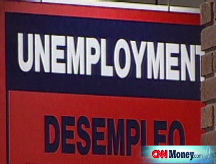Under-employed and under the radar
A growing number of people are working part-time jobs because they can't find full-time work, or abandoning their job search altogether.
| MMA | 0.69% |
| $10K MMA | 0.42% |
| 6 month CD | 0.94% |
| 1 yr CD | 1.49% |
| 5 yr CD | 1.93% |
NEW YORK (CNNMoney.com) -- The economic crisis has taken a severe toll on the nation's workforce. But while much of the discussion centers around layoffs and unemployment, a growing number of Americans are becoming under-employed - struggling to pay their bills on a smaller salary, or completely giving up on finding any work.
Unemployment claims have climbed to 7-year highs, but the number of people who have settled for part-time work or given up on finding a job altogether is the worst it's been in over 14 years, but isn't included in the official unemployment rate.
Because of the slowing economy and credit crunch, companies are not only laying off workers, but also scaling back hours and shifting some full-time employees to part-time shifts. That can make it extremely difficult for those workers already having trouble making ends meet in the face of higher gas prices and mounting expenses.
"Even workers who hold onto their jobs during a downturn can suffer on this dimension," according to Heidi Shierholz an economist at the Economic Policy Institute, a research group based in Washington. "Those additional 10 hours of work can be the difference for a family being able to make their rent, fill their gas tank, heat their homes."
The under-employment rate, which counts those without jobs who have become discouraged and stopped looking for work, as well as part-time workers who want full-time jobs, rose to 11% from 10.7%, the highest rate since April 1994, according to the Labor Department's monthly jobs report.
The report also breaks down the specific number of people working part-time jobs because they couldn't find full-time work or their hours had been cut back due to slack conditions, which jumped by 337,000 people to 6.1 million. That's the first time there have been more than 6 million part-time workers wanting full-time jobs since 1993.
That reading is up more than a third from a year ago, the biggest 12-month jump since the period right after the Sept. 11 terrorist attacks. Other than that short 2001 spike in the reading, there hasn't been a jump like this since the deep recession of 1982.
Those numbers really hit home for people like Sherida Jones, 48, who lost her job as a senior mortgage loan processor and underwriter in February 2007. Since then she's been unable to land a comparable job in the mortgage industry.
After her unemployment benefits ran out, Jones began waiting tables at a Mexican restaurant in her town of Lewisville, Texas.
Her part-time position pays $250-$350 a week - a far cry from the $72,000 a year she made as a loan processor, but Jones says she is quick to pick up extra shifts when she can to help make ends meet. She has never stopped looking for a full-time job.
"At this point I will take anything," Jones said.
Are you underemployed? Has your employer recently cut back your hours? Have you been forced to take a part-time job for lack of full-time work? Tell us about it. You could be profiled in an upcoming story on CNNMoney.com. ![]()



